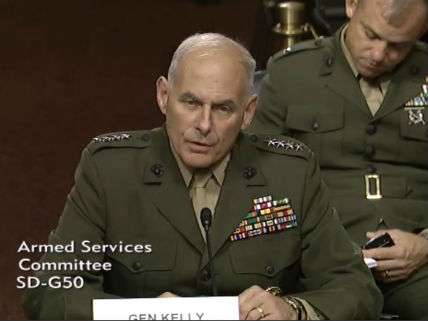Trump's Homeland Security Pick Shares His Simpleminded Faith in Drug Interdiction
John F. Kelly thinks the war on drugs is a failure because we do not spend enough on it.

Like Jeff Sessions, Donald Trump's choice for attorney general, the man he wants to run the Department of Homeland Security, John F. Kelly, is an old-fashioned drug warrior who is alarmed by the ongoing collapse of marijuana prohibition. But the secretary of homeland security, unlike the attorney general, does not have much power to interfere with state marijuana laws. And unlike Sessions' complaints about the Obama administration's toleration of marijuana legalization, which sit uneasily with Trump's commitment to respect state decisions in that area, Kelly's views on drug interdiction are perfectly consistent with the president-elect's simpleminded faith in the government's power to stop arbitrarily proscribed intoxicants from crossing the border.
"Kelly is a big-time drug war zealot," says Michael Collins, deputy director of the Drug Policy Alliance's national affairs office. "He is a true believer in the drug war, and it's incredibly worrying that he could now head up Homeland Security."
The Department of Homeland Security includes Customs and Border Protection, the Coast Guard, and the Transportation Security Administration, all of which play a direct or indirect role in the war on drugs. Kelly, a former Marine Corps general with an unrealistic notion of what can be accomplished by ships, aircraft, and men in uniform, is well-qualified to oversee these doomed antidrug activities, which apply military logic to a project that has nothing to do with foreign aggression or national defense.
As head of the Miami-based U.S. Southern Command for three years, Kelly witnessed the failure of drug interdiction and concluded that more interdiction was the answer. Testifying before the Senate Armed Services Committee in March 2014, he complained that budget cuts had forced him to dial back drug interdiction in the Caribbean. "Because of asset shortfalls, we're unable to get after 74 percent of suspected maritime drug smuggling," Kelly said. "I simply sit and watch it go by." Later that day he told reporters, "Without assets, certain things will happen. Much larger amounts of drugs will flow up from Latin America."
Kelly apparently thinks interdiction reduces the total amount of drugs reaching the United States. But that is not how interdiction works, to the extent that it works at all. Given all the places where drugs can be produced and all the ways they can be transported to people who want them, the most that drug warriors can hope to accomplish is to impose costs on traffickers that are high enough to raise retail prices, thereby discouraging consumption.
How has that been going? "With few exceptions and despite increasing investments in enforcement-based supply reduction efforts aimed at disrupting global drug supply," a 2013 study published by BMJ Open concluded, "illegal drug prices have generally decreased while drug purity has generally increased since 1990. These findings suggest that expanding efforts at controlling the global illegal drug market through law enforcement are failing."
The basic problem is that drugs acquire most of their value after they get to the country where they will be consumed, so seizing them en route has little impact on the cost to consumers. If Kelly had gotten the resources he wanted and increased interceptions of "suspected maritime drug smuggling," there is little reason to think the upshot would have been less drug use. The economics of drug prohibition mean there will always be more than enough smuggling to compensate for whatever fraction drug warriors manage to intercept.
Kelly thinks a determined government can overcome economics. He estimated that federal employees managed to seize 20 percent of the drugs moving toward the United States and implied that the share would be bigger if only he had a bigger budget. But if traffickers treat seizures as a cost of doing business and respond by boosting shipments, the percentage seized may stay exactly the same even as the amount seized rises. And since more seizures do not necessarily translate into noticeably higher retail prices, there is no reason to expect consumption will be reduced, which is supposed to be the ultimate goal.
Trump's understanding of drug interdiction is smilar to Kelly's. "I'm going to create borders," he promised in a campaign video. "No drugs are coming in. We're gonna build a wall. You know what I'm talking about. You have confidence in me. Believe me, I will solve the problem." Kelly, who shares the delusion that drug prohibition has been failing for more than a century simply because the government has not tried hard enough to enforce it, is a natural choice to guard Trump's magical wall.


Show Comments (54)